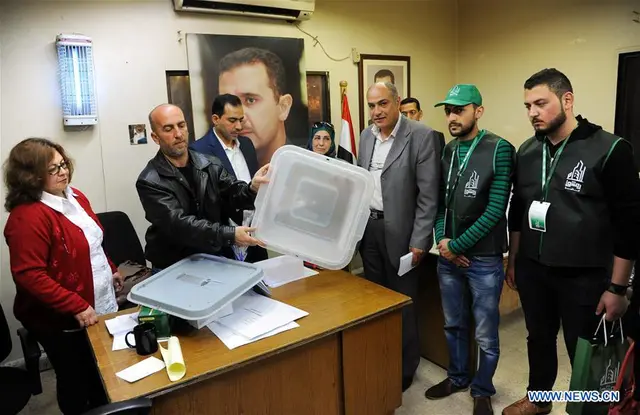Syrian university students participated in Wednesday's parliamentary elections, hoping the candidates would secure job opportunities for them.
In the Damascus University dormitory, students from various Syrian cities, including those from rebel-held areas, waited in queues to cast their ballots in the parliamentary elections which started earlier in the day.
Norhan, a university student from the southern province of Daraa, the birthplace of the country's five-year-old conflict, said Syrian youth must participate in the elections to choose people capable of delivering their objectives.
"The parliamentary election is an important process for the people and we should all participate and support this process in order to express our opinions and choose the right person who will live up to our hopes, represent us and deliver solutions to our problems to provide a better future," she told Xinhua.
Her friend, Siham, also from Daraa, said the elections are important for those coming from hotspots as it gives them a sense of belonging to their country, despite the fact that their cities have for long been out of government control.
"We came from hotspots and are here today to participate in the elections to choose the candidate who can fulfill our demands, such as improving university education, regulating food prices, and most importantly secure us job opportunities," she said.
Muhammad, another student from the northern province of Aleppo - also torn between the government and opposition militants - said the elections are a constitutional duty and a very important process towards efforts to rebuild the country.
"After five years of war, we must participate and vote to rebuild Syria, because Syria needs us, its youth. We must all join in, not just stand and watch from a distance."
Syria's parliamentary elections began on Wednesday, with some 3, 500 candidates vying for 250 parliamentary seats.
A total of 7,300 polling stations opened at 7 a.m. (0500 GMT) in government-controlled areas throughout the country, said the national Syrian TV.
Authorities said the elections will last until 7 p.m. Wednesday, adding that a five-hour extension is possible depending on the turnout.
Election subcommittees in government-controlled provinces announced their full readiness to facilitate the voting process.
In the capital city of Damascus alone, there are approximately 1,500 polling centers in addition to 540 polling stations for people from the provinces of Deir al-Zour, al-Raqqa, Idlib, Aleppo, and Daraa, mostly not government-controlled provinces.
In February, President Bashar al-Assad issued a decree to hold a parliamentary election on April 13.
The Syrian government said elections are set at their usual time since the Syrian government holds these elections every four years.
The last parliamentarian elections were held in 2012, just months after the war-torn country adopted a new constitution.
Syrian opposition boycotted this year's elections and the one in 2012 due to loss of confidence in the Syrian government.
Munther Khaddam, a member of the National Coordination Body (NCB) said his group will boycott the elections for the second time "as it comes through an abnormal context and runs counter to the Geneva talks political track."
Ali Arafat, a member of the opposition Popular Front for Change and Liberation, also said his group will boycott the elections.
"The current elections send a very negative message, especially since the Geneva talks focused on establishing a new government, so why have parliamentary elections which could be soon repeated after the new government is established?" he said.
However, the decision to hold the elections was interpreted by government loyalists as proof that Damascus is still an independent decision maker, and that the elections and the Geneva talks, set to resume soon, are separate from one another.
Ahead of the election, Information Minister, Omran al-Zoubi, said that elections for the people's assembly are a "constitutional right," adding that they send a message within the country and abroad.
"Election day will be an exceptional one in Syrians' political life, especially those who want a true opportunity to express their stance following five years of war in Syria," he told national TV.
Al-Zoubi said that the political process under discussion in Geneva is separate from the constitutional right and that the current constitution is valid until it is replaced by a new one.
Damascus's streets have been bedecked with candidate posters, in an attempt by the government to encourage people to vote. Enditem
 简体中文
简体中文

